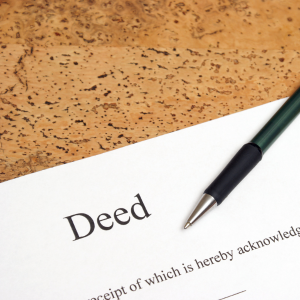
Why Is a Quitclaim Deed Important in Texas?

A quitclaim deed is an important legal tool for property transactions in Texas. It allows the transfer of interest in a property from one person (grantor) to another (grantee) without any guarantees about the title’s status. Unlike warranty deeds, quitclaim deeds do not ensure that the grantor owns the property or that the title is free of liens. Understanding these implications is crucial, especially in family transfers, estate planning, or resolving boundary disputes.
What Legal Rights Are Transferred with a Quitclaim Deed?
By completing a quitclaim deed, the grantor essentially waives all rights they might have in the property. Rather than for official sales, this kind of property transfer helps family members or co-owners clear ownership. Legal rights passed by a quitclaim deed in Texas have little effect on third-party claims, so they are less appropriate for conventional real estate transactions. Knowing Texas quitclaim deeds helps one stay out of legal hot water.
When Should You Consider Using a Quitclaim Deed?
Quitclaim deeds are used in specific cases such as estate planning, transferring property between relatives, or clarifying ownership when property boundaries are unclear. They are also helpful for correcting titles or in divorce cases where property is conveyed between ex-spouses. Before using a quitclaim deed, assess whether it fits your needs, considering the relationship between the grantor and grantee, existing ownership claims, and any liens or mortgages.
How to Prepare for Filing a Quitclaim Deed in Texas

Complying with state laws requires numerous processes when filing a quitclaim deed in Texas. Get the right quitclaim deed form first, then fill it out following Texas real estate deed requirements. Including the required information prevents legal problems or delays. Correct submission of the Texas deed filing depends on knowledge of its process.
What Documents Are Required During Preparation?
Preparing a quitclaim deed in Texas requires certain documents. These include the quitclaim deed forms detailing the property and parties involved and an affidavit verifying the information’s accuracy. The documentation must meet Texas’s legal requirements for quitclaim deeds, ensuring clarity and correctness. Properly completing these details supports a smooth property interest transfer.
Who Needs to Be Involved in the Preparation Process?
Several parties must be involved in preparing a quitclaim deed to ensure its validity. A notary public must witness the deed’s execution to affirm the grantors’ identities. Depending on the deed, witnesses might also be needed. Grantors must personally sign the document, following Texas’s execution requirements. Consulting a real estate attorney can provide guidance, ensuring all legal steps are followed and reducing future disputes.
Recognizing Common Mistakes in Quitclaim Deeds

Quitclaim deeds are often used to transfer property without guarantees in real estate transactions. However, these deeds can lead to legal mistakes if not done correctly. Common errors include inaccurately describing the property or missing essential parties and signatures. These mistakes can harm your legal rights and property ownership.
How Can These Mistakes Affect Legal Proceedings?
Mistakes in quitclaim deeds might create legal conflicts and compromise ownership rights, sparking litigation. Errors could also cause title problems, affecting both the buyer and the seller. Accuracy is crucial for maintaining rights and avoiding costly legal actions.
What Steps Ensure Accurate Completion?
To accurately complete a quitclaim deed:
- Accurate Documentation: Verify all information, including property descriptions and party names, is correct.
- Title Verification: Conduct thorough title checks to confirm current ownership.
- Notary Involvement: Have a notary witness the signatures to validate them.
- Legal Consultation: Seek legal advice to ensure compliance with state laws.
- Review Process: Perform a final deed review to check for errors or omissions before submitting it.
What Are the Key Differences Between Quitclaim Deeds and Warranty Deeds?

Knowing the differences between quitclaim deeds and warranty deeds is important for property transfers. Quitclaim deeds transfer ownership without guaranteeing the granter’s legal rights, whereas warranty deeds assure that the property is free from encumbrances and the seller has the right to transfer it.
When Is Each Type of Deed Typically Used?
- Quitclaim Deeds: Often used for transferring property between family members, correcting title defects, or as part of a divorce settlement.
- Warranty Deeds: These are typically used in traditional real estate transactions to assure buyers of a clear title and protect against future claims.
How Do They Affect Property Ownership Claims?
The choice of deed significantly impacts property ownership claims. Quitclaim deeds offer limited protection and may lead to property disputes and uncertain ownership rights. In contrast, warranty deeds provide title assurance, protecting against liens or claims.
For guidance on real estate documents like quitclaim deeds, consulting professionals such as We Buy Houses For Cash Dallas can provide tailored support.
The Role of Notarization in Quitclaim Deeds
Quitclaim deeds are common legal tools for transferring property rights, often used between family members or in cases without title warranties. Understanding the role of notarization is key to ensuring these documents are effective and legally compliant.

Why Is Notarization Essential for Validity?
Notarization is vital in establishing the validity of quitclaim deeds. A notary public witnesses and authenticates the signing, ensuring the document meets legal requirements and can withstand court scrutiny. This step adds security, confirming signatories’ identities and willingness to sign. Without notarization, the legitimacy of the deed can be questioned, potentially invalidating the property transfer.
How Do You Find a Qualified Notary Public in Texas?
To find a qualified notary public in Texas, look into available legal services and locate an authorized professional for notarization. Start by checking online directories or visiting local banks, libraries, or law offices that offer notary services. Verify that the chosen notary is commission-verified and familiar with executing quitclaim deeds. The Texas Secretary of State’s website provides resources to verify notaries’ credentials, connecting you with trusted professionals for your needs.
How Does the Filing Process Differ Across Texas Counties?
The filing process for property deeds, including quitclaim deeds, varies across Texas counties. Each county has specific legal procedures and requirements for successful document filing.

Are There Specific County Clerk Requirements?
Yes, there are specific county clerk requirements when filing property deeds. These may include documentation like proof of identity or additional forms accompanying the quitclaim deed. Contact the county clerk’s office where the property is located to verify these requirements. Many counties offer checklists or guides on their websites to assist with filing.
Do Filing Fees Vary by Location?
Filing fees for property deeds vary by location within Texas counties. Individual county regulations determine costs for processing and recording your quitclaim deed. To avoid unexpected expenses, research the filing fees in the relevant county beforehand. County clerk offices can provide detailed fee schedules or estimates based on your deed filing specifics.
If you need more detailed information on property transfers or have further questions, consider consulting a legal professional or real estate advisor.
What Happens After Your Quitclaim Deed is Recorded?
After your quitclaim deed is recorded in Texas, the transfer of property rights is officially documented. This step is crucial for legal recognition and helps prevent future ownership disputes. It’s important to keep accurate records and understand what follows this process.

How Do You Verify the Recording Has Been Completed?
To confirm your quitclaim deed has been recorded, contact the county clerk’s office where the property is located. Request a confirmation of the recording process. The office will prove that your deed is part of the official records. This verification protects your property rights under Texas deed recording processes.
What Records Should You Keep After Filing?
Once you’ve filed your quitclaim deed, keep the following documents for compliance:
- Certified Copy of the Recorded Deed: Obtain from the county clerk to prove the legal transfer.
- Original Quitclaim Deed: Store safely.
- Recording Confirmation: Keep documentation or receipts showing the deed was recorded.
- Correspondence and Receipts: Save any communications with authorities or payment receipts related to filing.
These records ensure compliance with Texas property deed laws and are essential documentation for future transactions.
How to Address Issues with Quitclaim Deeds Post-Filing
Issues may arise with quitclaim deeds even after filing. It’s important to address any concerns, disputes, or errors promptly. Understanding common problems and solutions will help resolve them efficiently.
What Are Common Disputes Involving Quitclaim Deeds?

Common disputes with quitclaim deeds include:
- Ownership Claims: Challenges regarding rightful ownership.
- Property Rights: Conflicts over the extent of transferred rights.
- Legal Proceedings: Litigation due to unclear documentation or contested transfers.
Resolving these disputes may require legal proceedings or mediation. Consulting a legal professional can help you navigate these situations effectively.
Can Amendments Be Made if Errors Are Found?
If you find errors in your quitclaim deed, you can make amendments. The process generally involves:
- Identifying the specific error in the deed.
- Filing a corrective deed with the county clerk’s office.
- Complying with Texas deed transfer laws.
This requires careful attention and may need legal assistance to ensure amendments are correctly filed. Addressing errors quickly is key to maintaining clear and accurate property records.
By following these guidelines, you can effectively manage quitclaim deeds in Texas. For more help, consult a legal expert.
How Does a Quitclaim Deed Impact Property Taxes in Texas?
A quitclaim deed is a tool for transferring real estate ownership without guaranteeing a clear title. In Texas, it is important to know how these deeds can affect property taxes for those involved.
Are There Any Tax Implications for Grantors or Grantees?

Executing a quitclaim deed in Texas may have tax implications for the grantor and grantee. While the deed alone doesn’t automatically change property taxes, certain situations might lead to tax changes:
- Transfer of Ownership: This action can lead to a reassessment of the property’s value, which might alter property taxes.
- Gift Tax Considerations: If the property is transferred without money changing hands, it could be seen as a gift, potentially triggering federal gift tax rules.
- Legal Requirements: Following Texas property deed laws is essential to avoid unexpected tax consequences.
Seeking advice from a tax professional or attorney can help both parties understand these tax aspects and ensure they comply with all relevant tax regulations.
How Can You Ensure Compliance with Texas Tax Laws?
To comply with Texas tax laws when handling a quitclaim deed, consider these steps:
- Filing Requirements: As Texas laws require, file the quitclaim deed with the county clerk.
- Maintain Legal Compliance: Ensure the deed includes all necessary details, such as the property’s legal description and signatures.
- Consult Professionals: Work with legal or tax experts to ensure the correct handling of all parts of the quitclaim deed process in Texas.
These practices can help reduce risks related to non-compliance and ensure that the property transfer follows legal standards.
Future Considerations and Best Practices for Using Quitclaim Deeds
Ensuring a smooth property transaction involves careful planning. Here are some best practices for using quitclaim deeds.
What Precautionary Measures Should Be Taken for Future Transactions?
When planning future property transactions involving quitclaim deeds, take these precautionary measures:
- Due Diligence: Thoroughly research the property’s title history to uncover potential issues.
- Deed Transfer Laws: Stay informed about Texas deed transfer laws to avoid legal issues.
- Checklist: Use a detailed quitclaim deed checklist for Texas to guide the transaction from start to finish.
These steps can help manage risks and support a legally sound property transfer.
How Can Consulting a Lawyer Benefit Your Property Transactions?

Hiring a lawyer for your property transaction can offer several benefits, especially when dealing with quitclaim deeds in Texas:
- Expert Guidance: An attorney provides specialized advice on executing a quitclaim deed to meet all legal requirements.
- Risk Management: Legal professionals can identify potential risks and suggest effective solutions.
- Compliance Assurance: Lawyers ensure the deed complies with Texas real estate deed transfer regulations, protecting your investment.
For more assistance, consult a real estate attorney to improve the outcome of your transaction and ensure a smooth legal process.
For additional guidance on real estate transactions in Texas, contact We Buy Houses For Cash Dallas to explore options for your needs.
Read on to learn how to sell a house in Texas. The tips and guidelines are applicable statewide, including cities like Dallas, El Paso, Houston, Austin, San Antonio, Fort Worth, and nearby regions. For personalized assistance, Contact Us at (469) 765-3669.
FAQs:
How do you download a Quick Claim Deed Form in Texas?
To download a quick claim deed form in Texas, visit trusted legal websites like LegalZoom or consult a local attorney. Ensure the form complies with Texas laws, fill it out, and have it notarized before submitting it to the appropriate county office.
What is a Quick Claim Deed, and How Does it Work in Texas?
A quick claim deed, often called a “quitclaim deed,” transfers any ownership interest the grantor has in a property to someone else without guarantees. In Texas, consult an attorney to understand its implications and follow the correct process.
Are There Different Types of Deeds in Texas?
Yes, Texas recognizes types like warranty deeds, special warranty deeds, and quitclaim deeds. Each serves different purposes, so seek professional advice to choose the right one for your situation.
Can I Use Remote Online Notarization for Deeds in Texas?
Yes, Texas allows remote online notarization, which is handy, especially during the COVID-19 pandemic. This involves using a secure platform to notarize documents electronically, ensuring compliance with state law.
Do I Need Title Insurance When Executing a Deed in Texas?
While not mandatory, title insurance is strongly recommended when executing a deed in Texas. It protects against potential legal issues that might arise regarding property ownership. Consult with insurance companies to find a suitable policy.
Can I Add or Remove Someone from a Deed Myself?
You can add or remove someone from a deed by filling out the appropriate forms, but it is wise to consult with an attorney. They ensure the process is correctly handled, preventing potential legal issues.
Should I Seek Professional Help to File a Deed in Texas?
Yes, seek professional assistance from a qualified attorney or real estate professional. They provide valuable insights, handle complex paperwork, and protect your interests.
What Are the Implications of Not Properly Filing a Deed in Texas?
Improper filing can lead to legal disputes, clouded titles, and potential loss of property rights. Always follow the correct legal procedures and consult with professionals to avoid these complications.
Key Insights
- Find resources to download a quick claim deed form in Texas, ensuring you comply with the state’s deed regulations.
- Our newsletter includes topics like the impact of COVID-19 on real estate, updates on insurance companies, and premium changes.
- We Buy Houses For Cash Dallas is dedicated to supporting the community during the coronavirus outbreak with expert advice.
- Explore our legal blog for articles on family law and esignature processes, essential for those representing themselves.
- If you’re looking to establish corporate actions or start a firm in Austin or Illinois, consider consulting with experienced ESQ professionals.
- Our regular updates will keep you updated on real estate developments, such as gas market changes and COVID-19 impacts.
- Our partnership with Cloudflare ensures data security while we promote using technology for effective client communication.
- Use our resources to educate yourself on due diligence and read testimonials from people who previously lacked legal guidance.
- Encourage proactive steps by thanking clients who learn about their legal rights and connect with potential advisors.
- Access our legal support network for real estate transactions in Michigan or advice on insurance matters.


